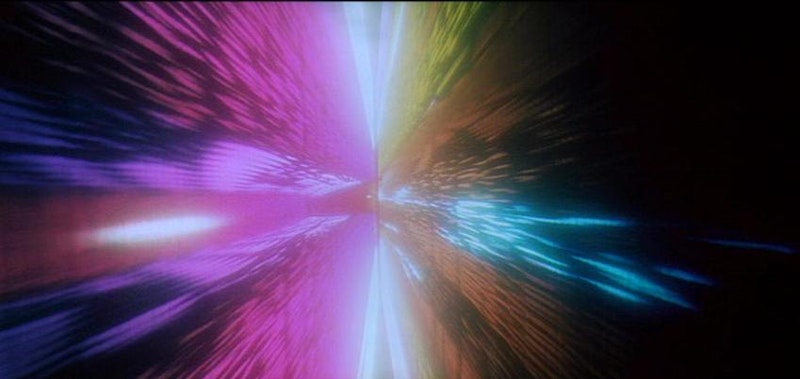It can be glorious to watch an accomplished person operating at the full height of their powers, regardless of the arena. It could be a stand-up comedian who’s killing for the entire set without so much as a hiccup, a jazz pianist who’s tuned into some ethereal frequency, or a controversial thinker getting grilled by a television interviewer and handling every sharp inquiry with grace and dexterity. Sometimes these dazzling performances are viewed by millions and can lead to fame and fortune, but even the plebes have a shot at a tiny slice of the glory when they’re “on their game” at the quotidian level. It happens regularly at local bowling alleys, softball fields, and even bars—a pool shark runs the pool table all night long and he’s legend for a couple of hours.
When athletes make the most difficult plays in sports look effortless, they’re said to be in The Zone. The Zone’s a rarefied mental space of supreme focus—a Zen-like state where all the detritus in the mind’s driven out so it can laser in on what’s happening on the tennis court, the football field, the 18th green, or wherever a ball needs to be put in a hole.
When you’ve watched a lot of sports, your memory blurs on some of the details—the highlight reel in your head has a limited capacity. That spectacular walk-off home run in May that was so thrilling years ago eventually becomes dormant in your mind— you’ll recall it only if something jogs your memory.
The sports fan’s memories that never fade are when the athlete’s in The Zone and the stakes are high. Think of San Francisco 49ers quarterback Joe Montana's four Super Bowl performances—all wins—when Joe Cool looked like he was just throwing the ball around in his backyard. Michael Jordan’s another. MJ’s intensity in the big moments manifested itself in every aspect of his body language. You just knew he wouldn’t be denied when everything was on the line. For me, however, the single most vivid memory of someone in The Zone is Reggie Miller’s astounding performance against the New York Knicks in Game Five of the 1994 Eastern Conference Finals at Madison Square Garden. The Indiana Pacers shooting guard dropped 25 points on the Knicks in the fourth quarter, but his team was still down by six with 18.7 seconds remaining in the game. Miller secured the impossible win by then scoring eight points in nine seconds. The sharpshooter was, as they also say, “out of his mind.” That “choke” gesture he then gave to the courtside Spike Lee must’ve been enormously satisfying.
When an elite athlete finds the door’s suddenly closed, denying them access to the mysterious powers they once took for granted, the story’s riveting, just as all great falls from grace are. The downfall evokes both horror and schadenfreude, as people love to see the powerful stripped of their status and reduced to their own pedestrian level. The most transfixing example of this phenomenon in modern sports history is Tiger Woods’ collapse after that Thanksgiving evening in 2009 when his wife chased the winner of 14 majors out of their Florida house with a golf club. Woods hasn’t found The Zone again in a major tournament since that day.
The Zone’s not the exclusive terrain of the nonpareil athlete, however. In fact, I have my own experience, however humble, of being there. For a period of approximately a year and a half, I was able to put a dart pretty much where I wanted it to go. Nothing like the pros can do, but I excelled in informal bar competitions. I was a semi-pro. The games were always for money, and I’d regularly make $25-$50 in an evening at various bars around town, which happened to be Tokyo. I can’t remember ever losing money during that period. It was all about zeroing in on a one square millimeter spot on the board and concentrating on it—and only it—through the release of the dart. It sounds simple, but most people let extraneous thoughts creep into their mind.
I had a good run, raking in at least enough cash to pay for my drinks on those evenings, but my “Thanksgiving evening” also arrived cruelly and out of the blue. My normal delivery would sometimes become a herky jerky motion in an upward direction because I could no longer get my right forearm to move forward properly. It was like a car that lurches forward, rather than smoothly accelerating, when put into gear. Sometimes it was so bad I’d have a hard time even hitting the dart board, which is like whiffing at a teed-up golf ball on the embarrassment scale. Something had invaded my brain. Mind and body would no longer work as one.
I stopped playing darts after a while, unable to fix the problem. About a year later, I threw some darts in a bar in New York’s East Village. I beat a guy who thought he was a dart hotshot. He acted shocked that he'd lost, which is what you often get from that type, or the other annoying bar type that’s showing off for their girlfriend at darts or pool. He didn’t know I’d once been on “the circuit” too. I haven’t played much more darts since that evening, however. Still, I look back fondly on those Tokyo nights.

